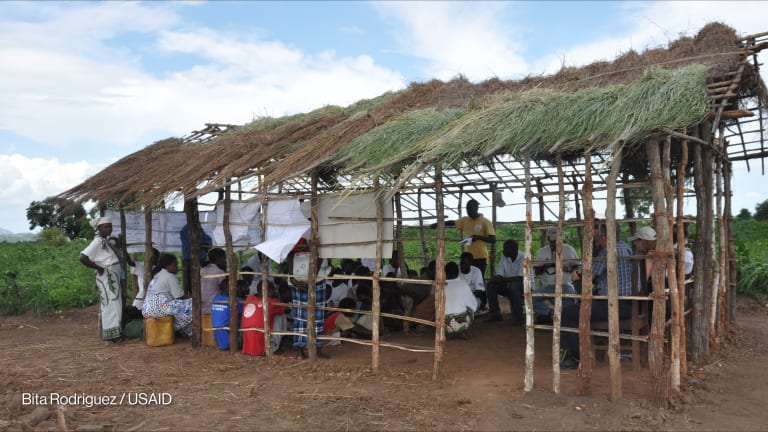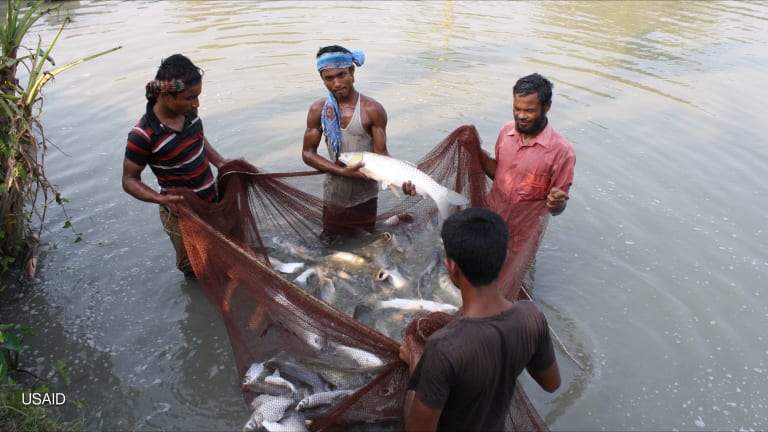NGOs question efficiency of emergency US food aid trust
A replenishment of an obscure trust managed by USAID could pull money away from flagship U.S. food assistance programs funded by the farm bill, which is up for reauthorization this year.
As global food prices spiked last year, the United States sent hundreds of millions to the World Food Programme from an obscure trust designed “to respond to unanticipated food crises abroad.” Now, with the trust’s coffers depleted, a replenishment could pull money away from flagship U.S. food aid programs that are funded by the same pot of money: the farm bill, which covers U.S. foreign food aid and is up for reauthorization by Congress this year. But among humanitarian NGOs, opinions differ on how Congress should fund the trust, which is known as the Bill Emerson Humanitarian Trust, or BEHT. All want to see it replenished, but at varying amounts. Meanwhile, some advocates question its utility as an efficient and cost-effective mechanism to respond to food crises — which are growing in number and intensity around the world — and are calling for changes to make it more flexible and responsive. “The current way the BEHT is being used is … like showing up to a house on fire with a garden hose. BEHT is being used as your last-ditch effort to combat global food insecurity. But the house is already on fire,” said Barrett Alexander, director of policy and advocacy at Mercy Corps, which is responding to food crises globally from Haiti to Yemen. BEHT, originally authorized in 1980, is jointly managed by the U.S. Department of Agriculture and the U.S. Agency for International Development. Its funds are used when resources allocated elsewhere by Congress are not enough to meet heightened global food insecurity. For example, when the war in Ukraine set off an unprecedented hunger crisis last year, $282 million from the BEHT was tapped to buy U.S. food commodities to ship overseas. Before that, the last time its funds were used was in 2014. The trust’s rules dictate that funds must be used to purchase U.S.-grown in-kind food. Because of the way the farm bill is funded, any increase in money for BEHT would likely come from Food for Peace accounts, which some NGOs oppose. Food for Peace is one of the flagship U.S. food assistance programs authorized by the farm bill, which also largely involves shipping U.S. commodities abroad. NGOs are now lobbying Congress to support U.S. food assistance programs authorized in the farm bill, which must be approved every five years. In addition to BEHT, these include programs to fund school meals, provide both emergency and nonemergency food aid, and the donation of U.S. commodities that are distributed as food or sold to fund projects. Reaching the trust’s full potential The farm bill currently authorizes BEHT to be replenished at $20 million per year, an amount Alexander says is not enough if its full potential is to be utilized. Mercy Corps would like to see that number closer to $40 million, and for the trust to be able to release funds in smaller increments of $50 million or $100 million when a crisis is brewing. “We’d rather see the BEHT move towards an anticipatory tool,” Alexander said. Historically, the trust has been drawn down hundreds of millions of dollars at times of widespread emergency, such as when grain prices spiked last year and made basic staples unaffordable in places from Sri Lanka to Yemen to Egypt. “The current way the BEHT is being used is … like showing up to a house on fire with a garden hose. BEHT is being used as your last-ditch effort to combat global food insecurity.” --— Barrett Alexander, director of policy and advocacy, Mercy Corps The coordination mechanisms in BEHT should also be strengthened in the midst of the most severe food crises, Alexander said. The trust should be automatically triggered, Mercy Corps says, when evidence of famine is expected using the Famine Early Warning System, the forecasting platform utilized by USAID. The World Food Programme USA, a nonprofit which raises money in the U.S. for WFP, said it wants to see a “significantly higher” amount authorized for BEHT but declined to say how much it is lobbying for. Rebecca Middleton, WFP USA chief advocacy and engagement officer, said the organization wants a “catalytic” investment in the first year, with lower amounts for the remaining four years of the five-year farm bill cycle. According to USAID, the majority of the $282 million disbursed from the BEHT last year went to WFP, while UNICEF and Catholic Relief Services also received some money. But the money WFP needed from the U.S. government to get BEHT commodities to where they needed to go was far more than what it got from the trust itself. In total, WFP received $614 million from the U.S. to aid populations in Yemen and the Horn of Africa. According to USAID, the additional funds required beyond the $282 million from the BEHT for commodities that were needed to finance “ocean freight charges, internal transportation, storage, handling, distribution, programming, and certain administrative costs” were paid for by the Commodity Credit Corporation within the USDA. High transport costs In addition to a “robust replenishment” of the trust, WFP USA seeks “dialogue” around how to make its operations more efficient in times of crisis, Middleton said. “Particularly as far as how it’s deployed, it’s a bit of an onerous process to get it activated,” Middleton said. One of the downsides to BEHT, some NGOs say, is that it is required to abide by cargo preference laws, which means the food shipped from the U.S. must travel on American ships. This is an expensive way to provide food aid, as much of the funds go toward overhead and transportation costs — demonstrated by the additional funds WFP needs to get commodities purchased with BEHT money to hungry people. WFP USA supported a waiver of cargo preference last year, Middleton said, but she declined to comment on whether they’d push for a permanent cargo preference exemption to be included in the farm bill when it comes to BEHT. She called shipping companies “good allies.” Mercy Corps and other groups, including CRS, are pushing for a cargo preference exemption for the trust. “Taking nine months to get U.S. commodities somewhere and shipped to the last port of call — that's not the responsive timeline to the needs of why the trust was created or why it’s being utilized today,” Alexander said. Another issue, according to CRS Senior Legislative and Policy Specialist Ari Shaw-Obasogie said, is the “exorbitant costs of getting food from point A to point B.” “One of the pain points around last year’s drawdown of the trust was … the associated costs were incredibly high,” Shaw-Obasogie said. “That raises a lot of red flags for members of Congress.” Debate over how to fund the trust CRS said it isn’t necessarily opposed to seeing the trust funded at levels higher than $20 million, but Shaw-Obasogie is concerned that funding could come at the expense of other programs. Because of the way the farm bill is funded, any increases in particular programs must result in decreases in others in order to keep the overall money spent at the same level. Mercy Corps isn’t necessarily concerned if the money is offset by Food for Peace funding. “[Food for Peace] is a $1.78 billion fund,” Alexander said. “So finding $20 million somewhere is not totally unreasonable.” As debates over the specific funding levels carry on, doubt is growing among NGOs that Congress will even be able to pass a farm bill by the September 30 deadline. Even so, Middleton said that the traditional bipartisan support for U.S. food aid funding made her “cautiously optimistic” a deal could be reached, as domestic provisions of the bill remain mired in politics. The Senate Agriculture Committee will likely pass an extension of the current farm bill at least until December 31, and potentially into next year, Shaw-Obasogie said. The longer an extension becomes, the less likely Congress is to be able to get the job done: The 2024 U.S. presidential election and competitive congressional elections mean that meaningful legislation will be at all but a standstill in Washington next year. “Is it possible in theory? Yes,” she said of passing the farm bill this year. “Is it going to happen? Not a chance.”
As global food prices spiked last year, the United States sent hundreds of millions to the World Food Programme from an obscure trust designed “to respond to unanticipated food crises abroad.”
Now, with the trust’s coffers depleted, a replenishment could pull money away from flagship U.S. food aid programs that are funded by the same pot of money: the farm bill, which covers U.S. foreign food aid and is up for reauthorization by Congress this year.
But among humanitarian NGOs, opinions differ on how Congress should fund the trust, which is known as the Bill Emerson Humanitarian Trust, or BEHT. All want to see it replenished, but at varying amounts. Meanwhile, some advocates question its utility as an efficient and cost-effective mechanism to respond to food crises — which are growing in number and intensity around the world — and are calling for changes to make it more flexible and responsive.
This article is free to read - just register or sign in
Access news, newsletters, events and more.
Join usSign inPrinting articles to share with others is a breach of our terms and conditions and copyright policy. Please use the sharing options on the left side of the article. Devex Pro members may share up to 10 articles per month using the Pro share tool ( ).
Teresa Welsh is a Senior Reporter at Devex. She has reported from more than 10 countries and is currently based in Washington, D.C. Her coverage focuses on Latin America; U.S. foreign assistance policy; fragile states; food systems and nutrition; and refugees and migration. Prior to joining Devex, Teresa worked at McClatchy's Washington Bureau and covered foreign affairs for U.S. News and World Report. She was a reporter in Colombia, where she previously lived teaching English. Teresa earned bachelor of arts degrees in journalism and Latin American studies from the University of Wisconsin.








